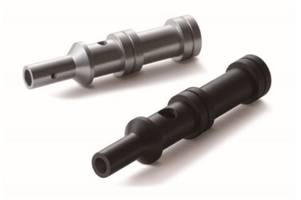CFRP Injection Molded Composite Replaces Machined Aluminum in Oil Control Valve

Metal-to-composite conversion reduces cost, weight, improves engine performance; material debuts at SPE ACCE this September
Phoenix, Ariz. – An Asian automaker has replaced machined aluminum with a unique carbon fiber-reinforced composite in an injection molded oil control valve within the variable valve timing system that controls engine intake and exhaust. The high-performance thermoplastic valve (2-8 valves per vehicle depending on engine size) reduces cost and weight and improves engine response time, hence engine performance. Called Sumiploy™ CS5530 resin, the polymer is produced by Sumitomo Chemical Co., Ltd. (Tokyo) and sold in North America by Sumitomo Chemical Advanced Technologies LLC (here), which will exhibit at the 18th-annual Society of Plastics Engineers’ Automotive Composites Conference & Exhibition (SPE® ACCE) from September 5-7 in the Detroit suburbs.
Sumiploy resin is a unique formulation of Sumitomo’s SumikaExcel™ polyethersulfone (PES) resin plus chopped carbon fiber and a proprietary additive package that boosts wear resistance and dimensional stability. The resulting high-performance composite offers excellent thermal resistance, good dimensional stability and long-term creep resistance over a broad temperature range, good impact strength, chemical resistance to aromatic hydrocarbons like gasoline, ethanol, and engine oil, inherent flame retardance, and high environmental stress-crack resistance (ESCR). Unlike many other high-temperature thermoplastics that are challenging to mold, Sumiploy CS5530 resin is high-flow, making it easier to mold high-precision 3D geometries in thin walls.
For the oil control valve application, key engineering requirements that Sumiploy CS5530 composite had to pass include ultra-high dimensional accuracy (10.7 mm ± 50 µm or 0.5%), thermal stability from -40 to 150o C, low coefficient of friction, chemical resistance to engine oils, and excellent fatigue strength and creep resistance. Drivers for making the change from machined aluminum to an engineering thermoplastic composite include lowering manufacturing costs, improving engine performance, and lowering weight. The part has been in commercial use since start-of-production (SOP) in 2015, thus establishing a proven record of performance. Being a thermoplastic, it is fully recyclable (melt reprocessable) at the end of vehicle life.
In addition to automotive use, Sumiploy resins are well suited for use in electrical/electronics and aerospace components to replace machined steel or aluminum as well as other high-performance thermoplastics like polyetheretherketone (PEEK), polyaryletherketone (PAEK), and polyetherimide (PEI). While not critical for this application, Sumiploy resins offer reduced friction against mating surfaces in minimally lubricated environments as well as enhanced functionality and lower manufacturing costs thanks to the parts consolidation from high-precision injection molding. Sumiploy resins are good candidates for metal replacement in applications like oil-control valve pistons, solenoid valve pistons, heating/ventilation/air conditioning (HVAC) vanes and pistons, industrial gears, and non-lubricated bushings and bearings.
For the first time, Sumitomo Chemical Advanced Technologies will exhibit at the 18th-annual SPE ACCE at the Suburban Collection Showplace in Novi, Mich. in booth number 221. The company will have information on Sumiploy polymer alloys as well as SumikaExcel PES, SumikaExcel micro-powder additive, and SumikaSuper™ liquid crystal polymer (LCP) on display for attendees.
Sumitomo Chemical Advanced Technologies LLC, formerly called Sumika Electronic Materials and a wholly owned subsidiary of Sumitomo Chemical Co., Ltd., is a leading manufacturer of polyethersulfone (PES), liquid crystal polymer (LCP), and high-performance alloy resins. The company serves as the U.S. base of operations and customer support for Sumitomo Chemical’s photoresist and engineering plastics businesses and is certified to ISO9001:2008 and ISO14001:2004 standards. For more information, see www.sumikamaterials.com/ or call +1.602.659.2500.
Contact: Peggy Malnati, Malnati & Associates LLC, +1.248.592.0765, peggy@malnatiandassociates.com
Phoenix, Ariz. – An Asian automaker has replaced machined aluminum (upper left) with a unique carbon fiber-reinforced composite (lower right) in an injection molded oil control valve within the variable valve timing system that controls engine intake and exhaust. The high-performance thermoplastic valve reduces cost and weight and improves engine response time, hence engine performance. Called Sumiploy™ CS5530 resin, the composite contains polyethersulfone (PES) resin, chopped carbon fiber, and a proprietary additive package. The composite oil control valve was required to pass demanding engineering requirements such as ultra-high dimensional accuracy (10 mm ± 10 µm or 0.5%), thermal stability from -40 to 150o C, low coefficient of friction, chemical resistance to engine oils, and excellent fatigue strength and creep resistance. Drivers for making the change from machined aluminum to an engineering thermoplastic composite include lowering manufacturing costs, improving engine performance, and lowering weight. The part has been in commercial use since start-of-production (SOP) in 2015, thus establishing a proven record of performance. Being a thermoplastic, it is fully recyclable (melt reprocessable) at the end of vehicle life.




